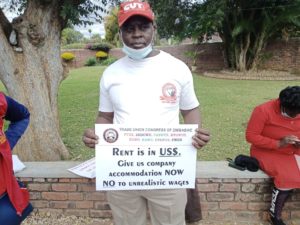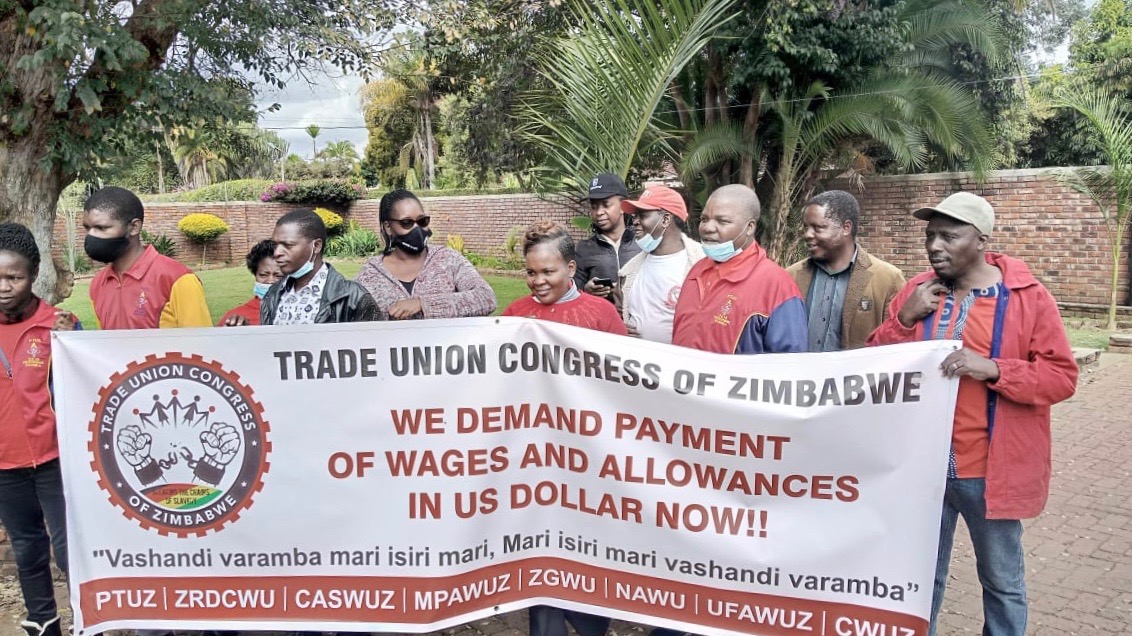Workers in Zimbabwe’s food and allied industries have been mobilizing against repression and unilateral attacks on wages and benefits by employers. Supported by the United Food and Allied Workers Union of Zimbabwe (UFAWUZ), workers at Ingwebu Breweries in the city of Bulawayo have denounced the non-payment of wages and the unfair dismissal of workers by the company.
UFAWUZ, a trade union federation, has accused Ingwebu Breweries of refusing to honor the increments agreed to in the collective bargaining agreement for the brewing and distilling sub-sector of the food and allied industries. “The employer is paying employees slave-like wages against what was agreed to for the industry,” the union said in a statement.
The union has also denounced that workers have not been paid their full wages for months. “There has been no effort made by the employer to mitigate the non-payment of wages or to prove that he is facing problems in paying the workers,” UFAWUZ deputy general secretary Ishumael Muzuru told Peoples Dispatch.
“Ingwebu has not paid the workers on time since January. Workers were paid a partial salary in September, and were not paid at all in October,” he added.
According to the collective bargaining agreement signed between the Brewing and Distilling Employers Association and the Brewing and Distilling Workers Union, the minimum wage for October to December 2022 was to be increased from ZWL140,000 to ZWL180,000. However, according to Muzuru, workers have been paid a “paltry ZWL100,000.”
“Retrenchment is actually one of the options provided under the law in case a company is struggling. It is also provided under law that if a company is struggling, it can apply to be exempted to pay wages at the level agreed to at the industry level for a certain period. There is then an inspection to confirm the inability to pay and for the exemption to be granted. But this company has not done that,” Muzuru stated.
UFAWUZ also accused Ingwebu of having halted submitting the money it deducts from workers’ wages for medical aid and funeral policies. The money is still being deducted from their wages even though the policies have been “rendered obsolete.” Not only have the workers not been paid, they have also lost access to medical aid.
A copy of a letter from September 2022 from an insurance company, shared with Peoples Dispatch, informed a worker that the funeral policy had lapsed and the pension policy had been paid for but with reduced benefits due to non-payment of the premium back in November 2021. Despite this, UFAWUZ stated, deductions had still been made from the wages.
In a further act of repression, Ingwebu Breweries dismissed all members of the workers committee who had been elected by the workers to represent them at the company level between July and August “for standing firm for their constituency” and demanding the outstanding wages.
The union has declared that it will “fight the employer using all means possible to protect the workers and their families” unless corrective measures are put in place immediately to ensure that employees’ rights are protected.
According to Muzuru, out of the 750 workers employed by the company, 500 are UFAWUZ members. The union has demanded Ingwebu to stop victimizing workers, pay all outstanding wages immediately, and pay termination benefits to all employees who were dismissed unfairly.
UFAWUZ has received support from the Trades Union Congress of Zimbabwe, to which it is affiliated. In a November 8 letter to Ingwebu Breweries human resources manager Dumisani Moyo, the TUCZ reiterated the demand for immediate corrective measures, failing which, “we [TUCZ] will be forced as the labor center to take further action against you without any further notice.”
UFAWUZ has also notified the police of their intent to carry out a demonstration and picket, and are now awaiting approval in accordance with Zimbabwean law.
Meanwhile, Ingwebu has been trying to force workers to form a new workers committee, which the workers have rejected, Muzuru said. Instead, workers have demanded that the dismissed members of the workers committee be reinstated.
Strike looms in sugar industry
As the struggle plays out in Bulawayo, UFAWUZ is gearing up for a massive strike in the sugar milling and production industry. Workers in the industry, particularly those employed by South African agri-business company Tongaat Hulett, have been demanding that wages be increased to cope with worsening economic conditions.
Tongaat Hulett is the largest sugar producer in Zimbabwe. It wholly owns Triangle Limited and has a 50.3% ownership of Hippo Valley Estates Limited, which operates the only sugar mills in the country.
“Workers in the sugar milling industry are the worst paid in the food industry in Zimbabwe,” UFAWUZ denounced in a statement. “The employer posts profits every year, he is selling his sugar in United States dollars but he does not want to pass on the USDs to the workers.”
In 2009, Zimbabwe had scrapped its national currency and opted for USD as its currency amid uncontrollable inflation. In 2019, it introduced the “new” Zimbabwean dollar, a surrogate currency called the Real Time Gross Settlement (RTGS) dollar, and outlawed other foreign currencies. However, a multi-currency system was reinstated in 2020.
The Zimbabwean dollar has lost 76.7% of its value against the USD since January. The Zimbabwe National Statistics Agency (Zimstat) reported that annual inflation stood at 268% in October, having reached 280% in September. At the time, the Zimbabwean dollar was reportedly trading at 800 to one US dollar in the parallel market.
As of November 16, the average interbank rate stood at 639.1 Zimbabwean dollars (ZWL) against one US dollar.
Zimbabwe is among countries worst-affected by high food price inflation in the world, according to the World Bank. It has also been impacted by the global rise in fuel prices, with the current price remaining about 18% higher despite government efforts to stabilize it. The price of vegetable oil had increased by 56% in July.
In the past few months, it was also reported that some retailers had begun quoting prices of products including milk and brown sugar exclusively in US dollars. “If the prices are marked in US dollars, it is only proper to pay your workers in the currency in which you are selling your products,” Muzuru said.

According to UFAWUZ, Tongaat Hulett has been adamant that it cannot pay the full wage in US dollars, but has proposed paying a cost of living adjustment in the currency.
UFAWUZ-affiliated unions, including the Sugar Production and Milling Workers Union, Zimbabwe Sugar Milling Industry Workers Union, and Sugar Milling and Allied Workers Union of Zimbabwe, notified their employers as well as the National Employment Council and the Ministry of Labor of their intention to embark on a collective strike action.
However, the process was blocked after the Tongaat Hulett subsidiaries filed a show cause order before the Minister of Labor in a hearing on November 10, asking the unions to provide reasons why they had resorted to the action instead of negotiating.
The unions made detailed submissions in response to the order on November 11, emphasizing that they had a 14-day period to fulfill various formalities related to the potential collective action, including a conciliation process presently pending at the National Employment Council.
The Ministry has not issued a decision on the matter yet. If a strike action does move ahead, it will involve 22,000 workers at Tongaat Hulett alone, Muzuru said.
While the unions have been mobilizing around wage-related issues, workers are also facing problems related to working hours, with shifts extending up to 12 hours without overtime and a lack of adequate safety gear.





